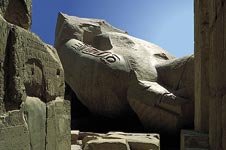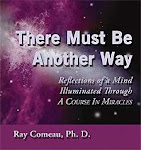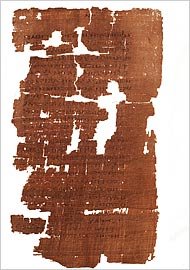 Percy Bysshe Shelley, the Romantic poet (1792-1822) was inspired to write the sonnet, Ozymandias, after seeing the broken colossus of Ramesses 11, an ancient Pharaoh of Egypt (1099-1069,BC).
Percy Bysshe Shelley, the Romantic poet (1792-1822) was inspired to write the sonnet, Ozymandias, after seeing the broken colossus of Ramesses 11, an ancient Pharaoh of Egypt (1099-1069,BC).I met a traveller from an antique land
Who said: Two vast and trunkless legs of stone
Stand in the desert. Near them, on the sand,
Half sunk, a shattered visage lies, whose frown,
And wrinkled lip, and sneer of cold command,
Tell that its sculptor well those passions read
Which yet survive, stamped on these lifeless things,
The hand that mocked them, and the heart that fed;
And on the pedestal these words appear:
"My name is Ozymandias, king of kings:
Look on my works, ye Mighty, and despair!"
Nothing beside remains. Round the decay
Of that colossal wreck, boundless and bare
The lone and level sands stretch far away.
(Shelley, 1817)
In this sonnet, the obvious irony is that at the time Ozymandias commissioned the sculptor to create his statue, the king's vast empire was visible everywhere, a great kingdom filled with treasures; yet, now the trunkless legs of stone/stand surrounded by nothing but desert.
This sonnet, almost 200 years old, retains its power because it reminds us that nothing in earthly form will endure.
Jesus tells us this in a lyrical passage in Matthew.
Lay not up for yourselves treasures upon earth, where moth and
rust doth corrupt, and where thieves break through and steal:
But lay up for yourselves treasures in heaven, where neither moth
nor rust doth corrupt, and where thieves do not break through nor steal:
For where your treasure is, there will your heart be also.
(Matthew 6:19-21)
And then, just in case we didn't get it the first time, He tells us this again in His Introduction to his unworldly masterpiece, A Course in Miracles.
Nothing real can be threatened.
Nothing unreal exists.
Herein lies the peace of God.
What is real is formless--Love, Joy, Truth, Peace, Serenity, Tranquility, Grace, Heaven.
What is unreal takes earthly form, that which we can see, hear, smell, taste, and touch.
It is not that we can escape form, being constantly immersed in it, making it up as we go along with thought-images that have no source in what is Real. It is simply a question of where your treasure is, a question of what you value. Ozymandias obviously valued the wrong things, all "things" being thought-images in form.
Jesus has us declare in the title to Lesson 133, I will not value what is valueless.
In one particular paragraph in this lesson, Jesus helps us evaluate what to choose.
If you choose a thing that will not last
forever, what you chose is valueless.
A temporary value is without
all value. Time can never take away
a value that is real. What fades and dies
was never there, and makes no offering
to him who chooses it. He is deceived
by nothing in a form he thinks he likes.
(W-p1.133.6)
Look on my works, ye Mighty, and despair!
Lay not up for yourselves treasures on earth.
The question persists: In the midst of form, how do we learn to value the formless? Jesus gives us a practice at the end of Lesson 133.
I will not value what is valueless,
and only what has value do I seek,
for only that do I desire to find.
(W-p1.133.13.4)
And then receive what waits for everyone
who reaches, unencumbered, to the gate
of Heaven, which swings open as he comes.
(W-p1.133.14:1)
Jesus even tells us how to be receptive.
Heaven itself is reached with empty hands
and open minds, which come with nothing to
find everything and claim it as their own.
(W-p1.133.13:1)
We stand with empty hands and open minds so that we can breathe in the breath of God. We ask to be inspired. "Inspire" comes from the Latin inspirare, "to breathe in." We receive the Holy "Spirit," from the Latin spiritus, meaning "to breathe, to blow." We breathe in the "animating vital principle that gives life." Say aloud right now, "Holy Spirit." This is to remind you that your voice is carried on your breath. "Holy Spirit." Voice is breath. The Holy Spirit is the Voice for God.
It is quite possible to listen to God's Voice all through the day without interrupting your regular activities in any way. The part of your mind in which truth abides is in constant communication with God, whether you are aware of it or not. The part that is listening to the Voice for God is calm, always at rest and wholly certain. It is really the only part there is. Try to identify with the part of your mind where stillness and peace reign forever. Try to hear God's Voice call to you lovingly, reminding you that your Creator has not forgotten His Son.
(W-p1.49.1,2)
We stand still to be inspired, to breathe in the Voice for God. That is why I wrote in the first sentence that Shelley was "inspired" to write this sonnet, just as the sculptor was inspired to sculpt the statue, his heart was fed by inspiration, the meaning of the phrase in the sonnet, the heart that fed, just as I was inspired to write this article. I value only the formless.
I want to be infomed in form only by the formless.
Nothing real can be threatened.
But lay up for yourselves treasures in heaven.
I ask for help in every moment not to forget my treasure. I ask for help to remember not to value what is valueless. I want to stay vigilant so that I do not mistake the ephemeral for the eternal, nothing for everything, the temporal for eternity.
I live for inspiration, breathing in the words carried on the breath of the Holy Spirit, experiencing Heaven on earth.
I am certain that's what St. Francis means in the first line of his great Prayer:
Lord, make me an instrument of Thy peace.
To read Lesson 133, click on the link below.
http://acim.home.att.net/workbook133.html

